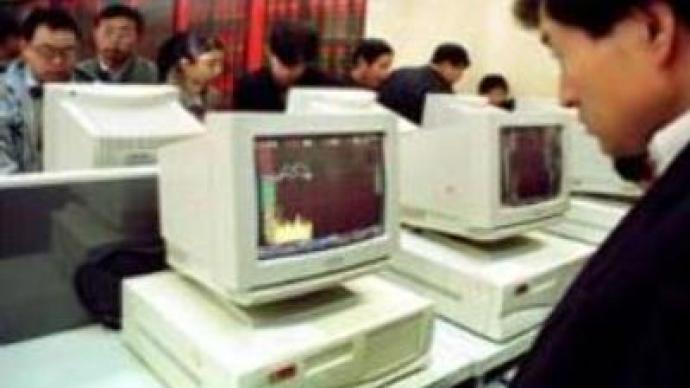Chinese shares demonstrate another drop

There's been another slump on the Chinese market, after its biggest drop in a decade on Tuesday. The Shanghai Composite Index fell more than 3% on Thursday morning.
The market was hit by renewed selling in financial blue chips after a poor performance of Hong Kong listed shares.But many investors remain optimistic. They believe Chinese authorities, who plan to list a string of big firms on the stock market this year, will not permit a collapse of the market.Just after Russia's stock exchange opened on Thursday, two of the major indexes MICEX and RTS have dropped by less than 1%.Experts say slight downward dynamics are likely to remain for some time.Russian market watchers said there is still hope it will eventually pick up, but the “spring rally” is likely to be delayed indefinitely. Also, concerns were voiced that a strong downward movement indicates this is not a one-day correction and that the fall could continue for the time being. The most negative outcome is that trust in emerging markets has been further eroded – thus, they warned, no influx of foreign capital should be expected in the foreseeable future.Wednesday trade in Moscow saw the RTS and Micex down again. Gazprom, Lukoil and Surgutneftegas were down as oil eased off recent highs during the Russian trading day, Sberbank and Severstal were up.But analysts say the causes of Tuesday's sell-off go far beyond China.In particular, worries about bad loans in the U.S. mortgage market, and comments from former Federal Reserve chairman Alan Greenspan that the U.S. might still be sliding towards recession, undermined confidence in U.S. stocks.And they point out that the Chinese economy is still performing strongly.“Sometimes the news itself is not that significant. It's just a lot of people have lots of profits they want to take off. Even with the correction yesterday the upturn on the Chinese market during the last 2 years has been spectacular. Obviously we are going to suffer if Chinese demand falls but the Chinese economy is still very strong. They are just going to curb the growth on the stock market. The real threat is the U.S. market. If the U.S. economy goes into recession that will affect all obviously. It is bad for the dollar, for the capital flee in the U.S. American demand is very important for the Chinese economy,” Tom Adshead, Portfolio Manager at Alfa Capital company in Moscow pointed out.U.S. stocks however rebounded on Wednesday after having their worst day in four years. The Dow and the NASDAQ rose about 0.5%.And the U.S. Federal Reserve Chairman Ben Bernanke calmed fears over the U.S. economy. “Federal Reserve in collaboration with the president's working group has been closely monitoring the markets. They seem to be working well, normally. We have been obviously closely monitoring the economy looking at the new data and trying to evaluate the implications for the forecast. My view is that taking all the new data into account there is no real material change in our expectations for the U.S. economy,” he underscored.
You can share this story on social media:












